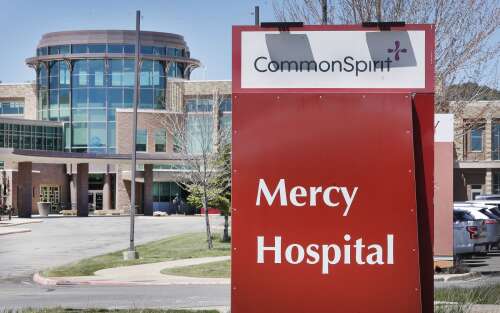Mercy Hospital in Durango is owned by Common Spirit. (Jerry McBride/Durango Herald File)
Jerry McBride
Individual market health insurance premiums could rise 5.5% next year, a little lower than the average over the past few years.
The state health department released a preliminary projection of the 2025 numbers.
Health insurance premiums are expected to rise 5.5% for people who pay for their own premiums, with a lower increase of 4.2% for those under the Colorado Option Plan, part of a state program aimed at providing better insurance at less cost.
About 5% of people have private health insurance of their own. About half of state residents get their insurance through their employer.
The rate is being closely watched to see whether health care reforms are helping consumers control health insurance costs. Gov. Jared Polis believes they are.
“Colorado leads the nation in saving our citizens money on health care,” he said in a press release. “We must continue to work hard to save our citizens money on health care.”
Two agencies, the governor’s office and the Department of Insurance and Regulatory Agencies, said premiums would have risen by nearly 23 percent if Colorado hadn’t put in place a so-called reinsurance program that protects insurers and helps lower health care costs.
State reinsurance programs work by paying a portion of high claims, allowing insurers to lower premiums for individual health plans.
The Department of Health estimates the program will save Coloradans a massive $477 million in 2025, with some areas of the state seeing the biggest benefits.
“In many counties in the western half of Colorado, premiums would be more than 40 percent higher without reinsurance. In Mesa County, premiums would be 43 percent higher without reinsurance,” the release said.
During the 2023 open enrollment period, Colorado Option plans accounted for 34% of all health insurance plan selections made through Connect for Health Colorado, the state’s health insurance exchange. That’s a 188% increase in enrollment over the previous year, according to the state.
The Colorado Consumer Health Initiative, one of the state’s consumer health advocacy groups, said it is “cautiously optimistic” that the overall rate increase will be in the 4 to 6 percent range.
“But Colorado families are still being hurt by the high cost of prescription drugs and despite insurers and others in the health care industry being able to better control costs,” Adam Fox, the group’s vice president, said in a news release. He noted that several insurers in the individual market have proposed price increases that average more than 8 percent, “and these require closer scrutiny.”
The group said it will work closely with the public to review the proposed increases and provide feedback to the insurance department “in hopes of putting further pressure on the proposed increases.” The final approved plans and premiums will be made public in mid-October. In the meantime, the DOI will be reviewing the information submitted by companies to ensure that premium changes are justified and that plans comply with state and federal regulations.
To read more stories from Colorado Public Radio, visit www.cpr.org.


